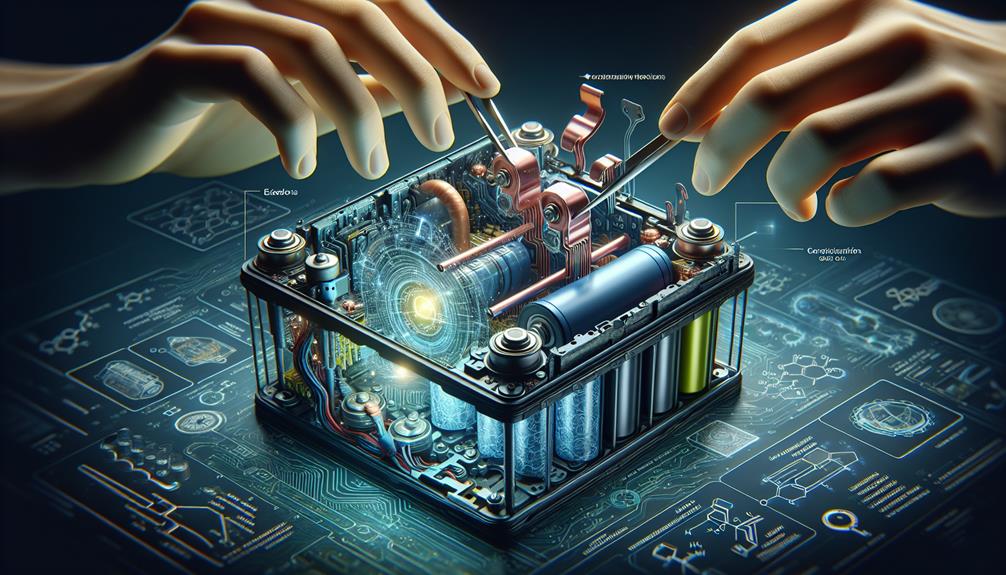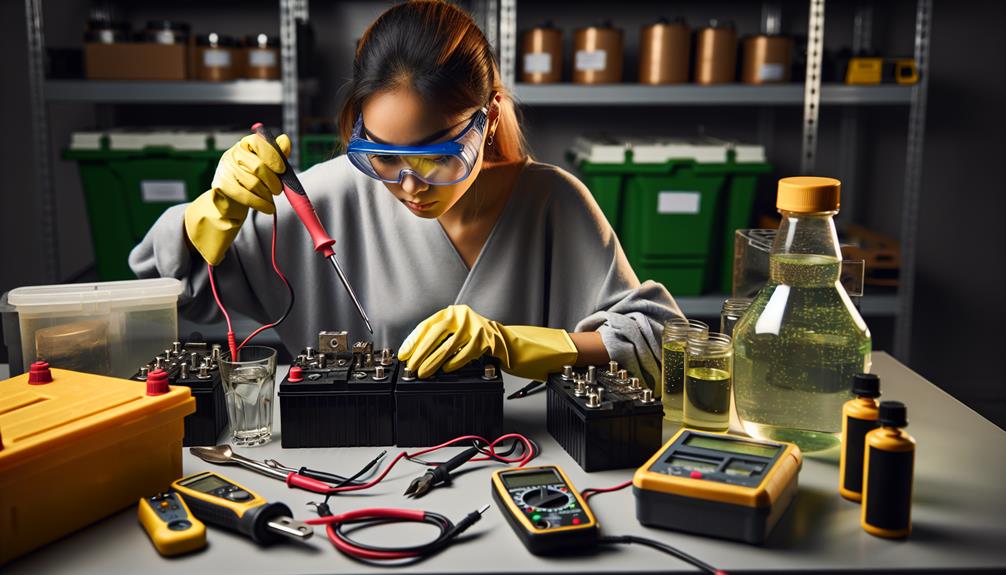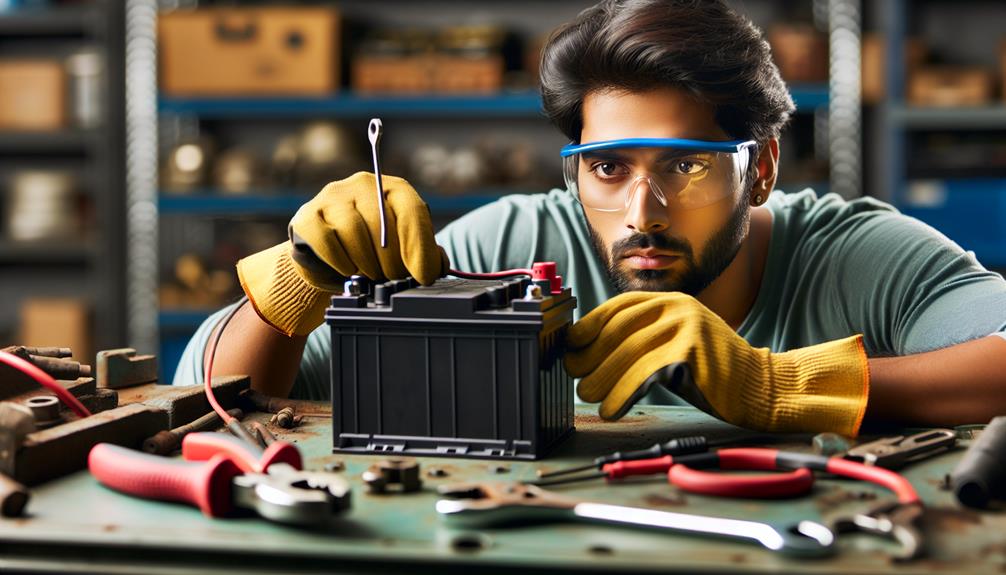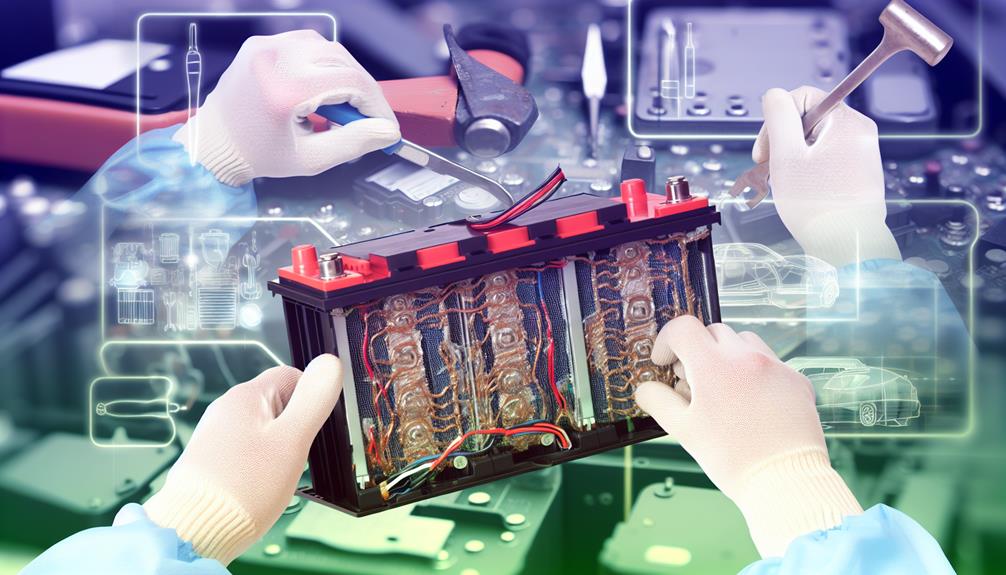Does Reconditioning Batteries Really Work
You may be skeptical about the effectiveness of reconditioning batteries, questioning whether it's truly worth your time and effort. However, before dismissing the idea, it's important to consider the growing body of evidence supporting this practice.
Does Reconditioning Batteries Really Work
By exploring the science behind battery reconditioning, the common methods used, and the benefits it can bring, you'll gain a deeper understanding of its potential.
Does Reconditioning Batteries Really Work
Prepare to be intrigued as we uncover the factors that can affect the success of battery reconditioning, as well as real-life examples showcasing its effectiveness.
Does Reconditioning Batteries Really Work
Get ready to unlock the secrets of reconditioning batteries and discover if it truly lives up to the hype.
Does Reconditioning Batteries Really Work
Key Takeaways
Does Reconditioning Batteries Really Work
- Battery reconditioning is a scientifically proven method that can revitalize worn-out batteries.
- There are different methods for reconditioning batteries, including using desulfator devices, DIY discharge and recharge processes, and specialized chargers with reconditioning modes.
- Reconditioning batteries can save money by reviving old batteries instead of buying new ones, extend the lifespan of batteries, and reduce environmental impact by minimizing battery disposal in landfills.
- The success of battery reconditioning depends on factors such as the choice of reconditioning techniques, battery age and overall condition, and the understanding that reconditioning may improve performance but not completely restore batteries.
The Science Behind Battery Reconditioning
Does Reconditioning Batteries Really Work

Battery reconditioning is a scientifically proven method that revitalizes worn-out batteries, allowing them to regain their original capacity and performance. The battery reconditioning process is based on understanding the mechanism behind battery rejuvenation.
Does Reconditioning Batteries Really Work
When a battery is used for a long time, its performance starts to decline due to the build-up of sulfate crystals on the lead plates inside the battery. These crystals reduce the battery's ability to hold a charge and deliver power.
During the battery reconditioning process, these sulfate crystals are dissolved and removed from the lead plates. This is typically achieved by using a specialized charger that applies a high voltage pulse to the battery. The high voltage breaks down the sulfate crystals and restores the battery's ability to hold a charge effectively.
Once the sulfate crystals are dissolved, the battery can be charged and discharged normally. This process helps to rejuvenate the battery and extend its lifespan. However, it's important to note that not all batteries can be reconditioned, especially if the damage is severe or if the battery has been damaged due to physical reasons.
Common Methods for Reconditioning Batteries

One common method for reconditioning batteries involves using a desulfator device. This device is designed to remove the buildup of sulfate crystals on the battery plates, which is a common cause of battery failure. By using a desulfator, you can restore the battery's capacity and extend its lifespan.
Another method for battery restoration is through the use of a DIY battery repair process. This process usually involves discharging the battery completely and then recharging it slowly, allowing the battery to regain its full capacity. It's important to follow the specific instructions for your battery type to ensure safe and effective reconditioning.
Additionally, you can try using a battery charger that has a reconditioning mode. This mode pulses high voltage into the battery, breaking down the sulfate crystals and revitalizing the battery. This method is often used for lead-acid batteries but may not be suitable for all battery types.
It's important to note that not all batteries can be reconditioned, especially if they've suffered from severe damage or have reached the end of their lifespan. However, for batteries that are still in good condition but have lost some of their capacity, reconditioning methods can be effective in restoring their performance and prolonging their usefulness.
Benefits of Reconditioning Batteries

When reconditioning batteries using these methods, you can experience a range of benefits that enhance their performance and extend their lifespan. Here are some of the advantages of reconditioning batteries:
- Cost savings: Reconditioning batteries can save you a significant amount of money. Instead of constantly buying new batteries, you can revive your old ones and make them work like new again. This means you won't have to keep shelling out money for replacements, which can add up over time. Reconditioning batteries allows you to get the most out of your existing batteries and reduce your expenses.
- Extended lifespan: By reconditioning batteries, you can extend their lifespan considerably. When batteries start to lose their performance, reconditioning methods can help restore their capacity and efficiency. This means you can continue using your batteries for a longer period before needing to replace them. Not only does this save you money, but it also reduces waste and contributes to a more sustainable lifestyle.
- Reduced environmental impact: Reconditioning batteries is an eco-friendly practice that helps reduce the environmental impact of battery disposal. Batteries contain harmful chemicals that can seep into the soil and water if not disposed of properly. By reconditioning batteries and using them for a longer time, you can minimize the number of batteries that end up in landfills. This contributes to a cleaner and healthier environment for future generations.
Factors Affecting the Success of Battery Reconditioning

Maximizing the success of battery reconditioning relies on several key factors that can significantly impact the effectiveness of the process. One of the crucial factors is the choice of reconditioning techniques. There are various methods available for reconditioning batteries, such as using chemical additives, desulfation, and deep cycling. Each technique may be more suitable for different types of batteries and specific conditions.
Another important factor to consider is the age of the battery. The impact of battery age on the success of reconditioning can't be overlooked. Generally, older batteries may have more extensive wear and tear, which can make the reconditioning process more challenging. It's essential to understand that while reconditioning can improve the performance of older batteries, it may not completely restore them to their original capacity.
Furthermore, the overall condition of the battery plays a significant role. Batteries that have been subject to extreme temperatures, physical damage, or prolonged neglect may be more difficult to recondition successfully. It's crucial to assess the battery's condition before attempting the reconditioning process to determine its potential for success.
Real-Life Examples of Successful Battery Reconditioning

To see the effectiveness of battery reconditioning in real-life scenarios, let's explore some examples of successful reconditioning efforts. These success stories demonstrate the potential of battery reconditioning to extend the lifespan of various types of batteries, saving you money and reducing waste.
- Car Batteries: Many car owners have successfully reconditioned their old and seemingly dead car batteries. By using simple techniques like desulfation and equalizing, they were able to revive their batteries and restore their performance. This not only saved them from buying a new battery but also ensured their vehicles continued to run smoothly.
- Laptop Batteries: Laptop users have also experienced success in reconditioning their batteries. By recalibrating the battery and using specialized software to reset the battery's internal circuitry, they were able to bring their dying laptop batteries back to life. This allowed them to use their laptops for longer periods without needing to be constantly plugged in.
- Power Tool Batteries: DIY enthusiasts and professionals alike have discovered the benefits of reconditioning power tool batteries. By applying techniques like deep cycling and refreshing the battery's cells, they were able to significantly improve the battery's performance and extend its overall lifespan. This meant less downtime and more productivity during their projects.
These real-life examples demonstrate the effectiveness of battery reconditioning and the potential it holds for saving money and reducing waste. By giving new life to old batteries, you can enjoy extended battery performance and contribute to a more sustainable future.
Frequently Asked Questions
Are There Any Risks or Dangers Associated With Reconditioning Batteries?
When reconditioning batteries, it's important to be aware of the risks involved. However, by following safety precautions such as wearing protective gear and working in a well-ventilated area, you can minimize any potential dangers.
How Long Does It Typically Take to Recondition a Battery?
On average, it takes about 4-6 hours to recondition a battery. During the reconditioning process, the battery is restored to its optimal performance, saving you money and extending its lifespan.
Can Any Type of Battery Be Reconditioned, or Are There Limitations?
Any type of battery can be reconditioned, but there are limitations. Some batteries, like lithium-ion, are more difficult to recondition than others. It's important to research and understand the reconditioning process for specific battery types.
Is Battery Reconditioning a Cost-Effective Alternative to Buying New Batteries?
Battery reconditioning is a cost-effective alternative to buying new batteries. Not only does it save you money, but it also reduces the environmental impact of battery disposal. Plus, it's a great way to belong to the community of eco-conscious individuals.
Are There Any Specific Tools or Equipment Required for Battery Reconditioning?
To recondition batteries, you'll need a few tools like a voltmeter, battery charger, and safety goggles. The step-by-step process involves discharging, cleaning, and recharging the battery. It's a cost-effective way to extend battery life.
Conclusion
In conclusion, reconditioning batteries is a science-backed method that can breathe new life into old batteries. By employing common methods and considering various factors, such as the battery's age and condition, successful reconditioning can be achieved.
The benefits of reconditioning batteries are numerous, including saving money, reducing waste, and promoting sustainability.
So, why throw away those old batteries when you can give them a second chance to shine? Unlock the hidden potential and power up your devices with reconditioned batteries.

